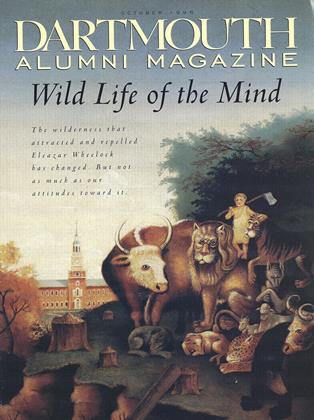The bumper crops rising from Dartmouth's organic farm include more than plants. After a year of full-scale operation, the student-run enterprise has proven fertile ground for everything from poetry to history to science.
Amy Thomas '97 secured a Rockefeller grant to write poetry at the farm, two miles from the Dartmouth campus on the Lyme Road. "When you're a writer what you are doing and where you are living informs your metaphors," she says. "The farm is a synthesis of what is important to me—art, poetry, nature."
Amy Crowell '97 combined her women's studies and environmental studies majors in an independent study on the traditional agriculture of Iroquois and Algonquin women. Crowell planted the "Three Sisters" of Native American farming—corn, beans, and squash—from seeds she obtained from a cultural preservation organization.
Christine Kosonen '98 is writing children's stories based on the farm. Researching Upper Valley folklore, seasonal celestial events, and wildlife, she plans to incorporate the farm's sense of place, "and its magic the magic of imagination," into fictional children's tales.
Matt Stembridge '99 collected oral histories from farmers in the Upper Valley and his home state of Washington. His project was funded with a First Year Summer Research Grant from the College.
There were class projects as well: environmental studies students analyzed soil, and an architecture class designed farmstands and greenhouses.
And, of course there was the food. According to fulltime in tern Jim Hourdequin '97, the farm sold produce to the Moosilauke Ravine Lodge, Dartmouth Dining Service, Hanover Inn, and students at a twice-weekly farmer's market stand at the Collis student center.
Dartmouth Gothic: ChristineKosonen '98, Jim Hourdequin'97, Lisa Core '98, and MattUngerer '97.
 View Full Issue
View Full Issue
More From This Issue
-
 Feature
FeatureThis Man Is an Island
October 1996 By ROBERT SULLIVAN '75 -
 Feature
FeatureNaming the Animals
October 1996 By Robert Pack '51 -
 Feature
FeatureDON'T CALL HIM ANONYMOUS
October 1996 By Jeanhee Kim '9O -
 Cover Story
Cover StorySecond Nature
October 1996 By Jay Heinrichs -
 Feature
FeatureDartmouth's Night
October 1996 -
 Article
ArticleKnowing Your Place
October 1996 By Jim Collins'84
Article
-
 Article
ArticleGRADUATES OF ASSOCIATED SCHOOLS RECEIVE POSITIONS
June, 1912 -
 Article
ArticleIt may not be amiss thus early in the academic
January, 1923 -
 Article
ArticleCorporation Support
November 1956 -
 Article
ArticleTake a Hike!
Sept/Oct 2009 -
 Article
ArticleTrack
FEBRUARY 1959 By CLIFF JORDAN '45 -
 Article
Article1913*
May 1939 By WARDE WILKIN'S

